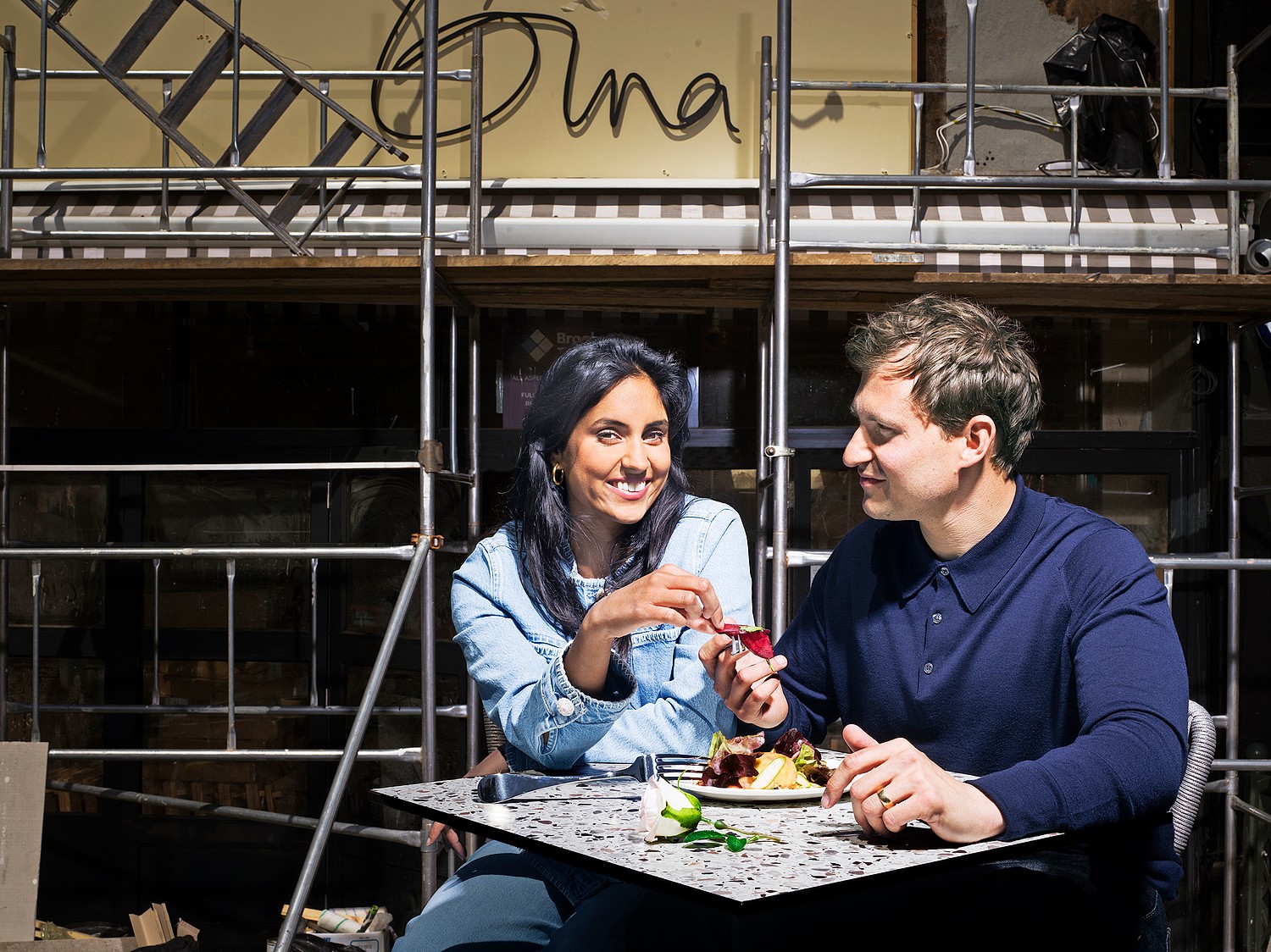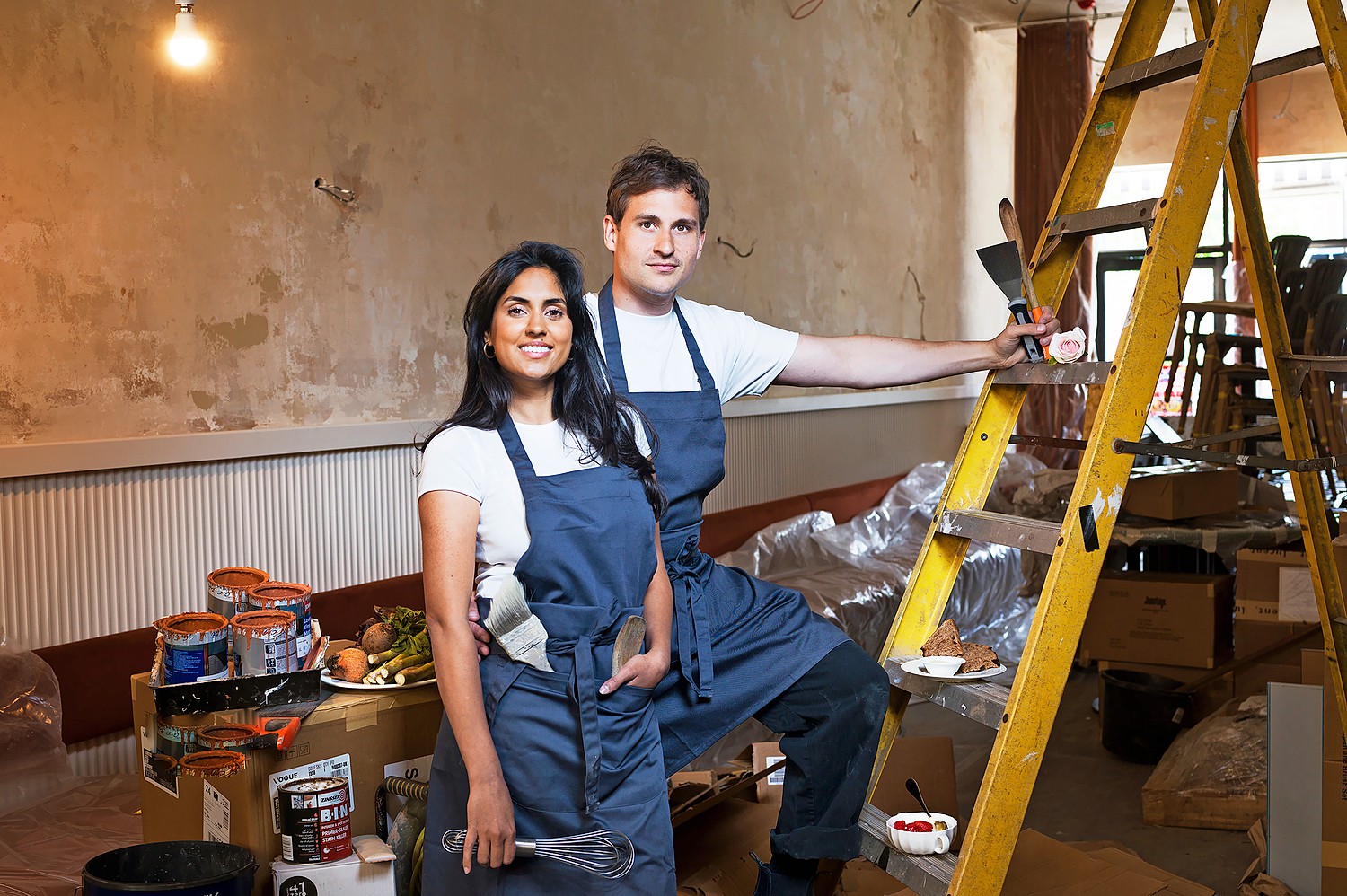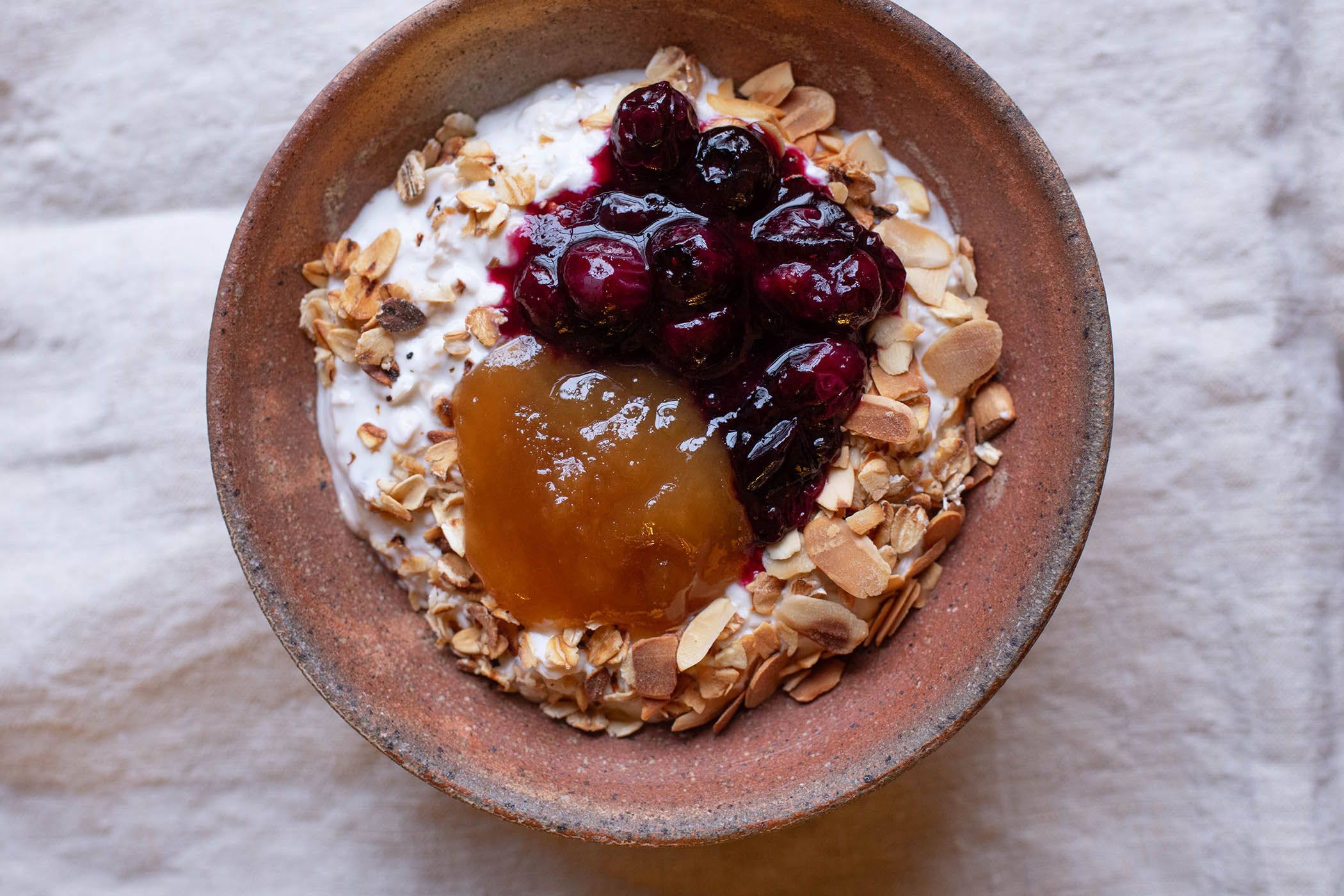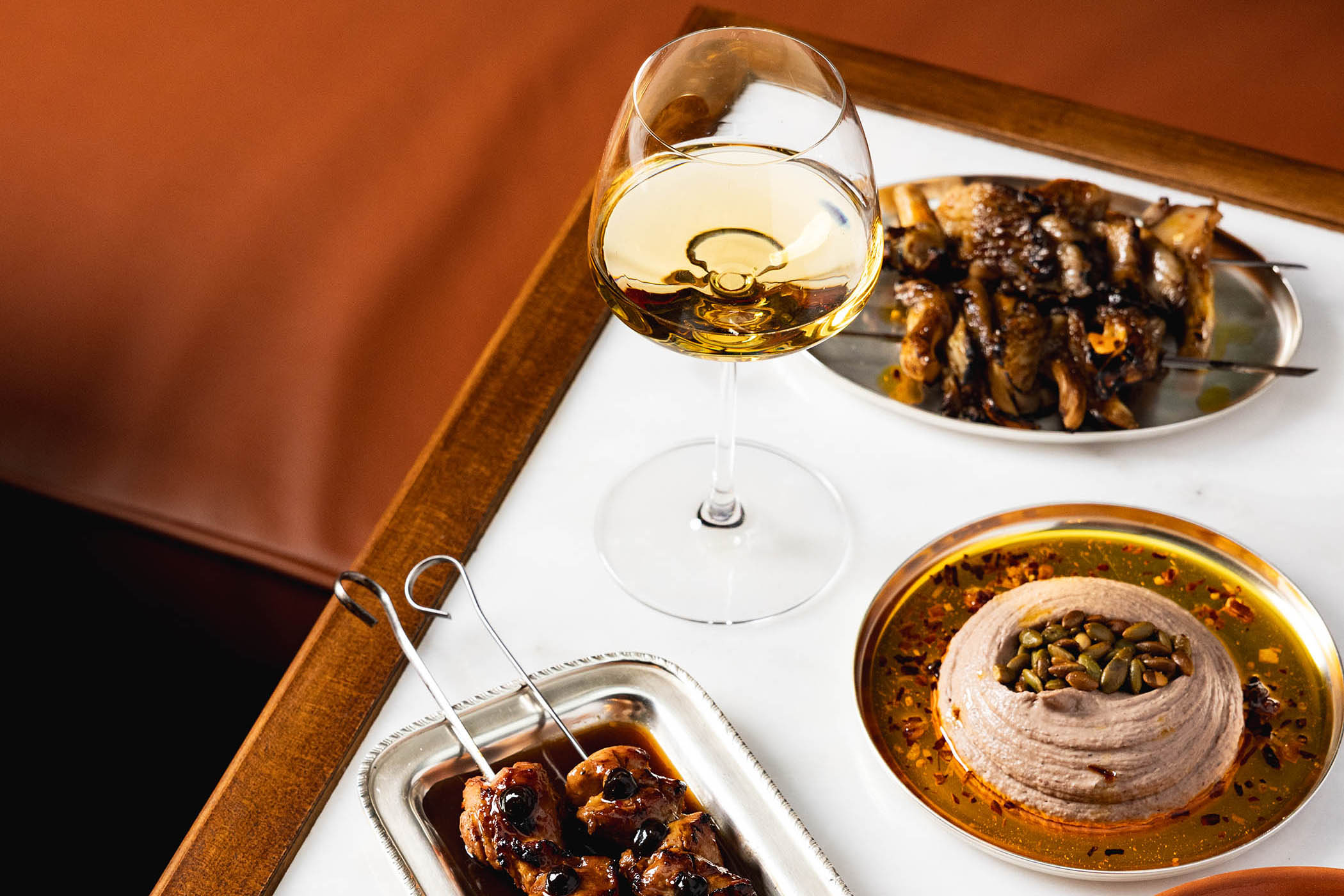Photographs Pål Hansen
I knew that Ravneet Gill and Mattie Taiano’s new restaurant was not quite finished but had no idea it was a hard hat situation. At 92 Station Road, Chingford, electrics hang from the ceiling like vines. Workmen slalom through the kitchen with refrigerator units boxed up on trolleys. Gill and Taiano are swabbing the steel worktops with a pack of industrial-strength Big Wipes. They might be too busy to do this interview: “Is it OK if we keep on doing this while we talk?” They have a faraway look in their eyes: the marker of mild but sustained panic. When we meet, Gina is due to open in a few weeks.
There is currently no heat, and no gas, and no sign of hot food in the place that will soon be a top-notch family-run chophouse run by Junior Bake Off’s pastry whizz Gill and Taiano, a chef who has worked in many of London’s finest restaurants. Instead of hot food, Taiano knocks out a colourful raw salad on the one area of the worktop without a tool on it and hands me a piece of asparagus shaved as thin as paper: “Bit grassy?” he says, scanning my face. It is just as grassy as raw asparagus should be. The premises were in worse shape than they thought when they took them on: the extractor fan fed straight into a cupboard. If they don’t open on time that could mean losing money, but Taiano looks dazed. “The thing is, there’s not much you can do, is there …”
Their wedding, an intimate celebration followed by a big Indian one, was featured in Vogue in 2024. But opening a restaurant without financial backers, with a one-year-old baby when you’ve said that running a restaurant is the one thing you’d never do, “Well, we’ve got to be careful because this is divorce territory, isn’t it?” says Taiano, deadpan. “Well, I mean, it could be, right?” They are one of those couples so well matched, they coast along on a kind of constant ribbing.
“Both me and Mattie said we would never be so stupid as to open our own restaurant, because it would be like having a baby, and we didn’t think we wanted a baby either,” says Rav. “Now we have a baby and a restaurant. It wasn’t really a conscious decision. It’s hitting me more now that it’s maybe a bit of a difficult setup, and what the fuck am I going to do?”
Gill is a favourite judge on Junior Bake Off, replacing Prue Leith in 2021, and was also, among many other things, pastry chef at the much loved St John in Clerkenwell, where puddings are an important part of the menu for those less keen on eating bone marrow with a spoon. (“I always give credit to St John as the restaurant that made me,” she said in an Instagram post celebrating the restaurant’s 30th anniversary last year.) Since February she has taken the extraordinary decision to document the entire process of setting up their own place on their Substack, Club Gina – the first post was titled “The worst year ever to open a restaurant”. “Why do so many high street restaurants sit empty?” she asks. “Why is it so hard to get small businesses off the ground?”
‘We’ve got to be careful because this is divorce territory, isn’t it?’
‘We’ve got to be careful because this is divorce territory, isn’t it?’
Gill, as we’ll see, has a belief in what she calls “radical transparency” (she founded Countertalk, a network designed to promote healthy working environments in the notoriously unhealthy hospitality industry). Her writing is rich in the kind of detail most restaurateurs would never dream of sharing: before they had even set foot in 92 Station Road, she admits, the couple had spent exactly £181,900.12 – “a financial commitment so intense it can make or break you before you get the keys”.
“There’s a huge gap in the public understanding of what it actually takes to create a restaurant that feels thoughtful, warm and well run,” she tells me. “So many of the little details that customers enjoy are taken for granted, and I wanted to reveal the human side behind them. It’s important to talk about the business realities: service charge, margins, staffing, logistics; all the less romantic sides that are still fundamental. At the end of the day, a restaurant isn’t just a creative project or a dream – it’s a business. And I think it’s time we talked about it that way.”
Related articles:
There’s advice about the hidden costs of flooring; accounts of staging “strategic walkaways” to help knock a premium down; and in a post entitled “Where for art thou, shiny investor”, Gill looks for the silver lining in not having one – no vested shares, or growth that doesn’t align with your personal vision. “Before long, your once small passion-driven project is one of 20 and you’re either cashing in or burning out.”
She put all her Bake Off savings into the business and took out a small loan; they have also put a lot on credit, “which has been great, because you can get 0% interest on kitchen equipment”. She did try to get a backer, really hard, she tells me – but her name and her TV work mattered not a jot.
Newsletters
Choose the newsletters you want to receive
View more
For information about how The Observer protects your data, read our Privacy Policy
“When I tell people I’m a chef they look at me like I’m a stupid little girl! I get it all the time,” she cries. “The TV work hasn’t got me anywhere. Even when I’ve said I have a few books (The Pastry Chef’s Guide and Sugar, I Love You) they look at me like I’m stupid.” When she met the landlord at their new premises, “even that was like a bloody episode of The Apprentice! I was trying to say, ‘I think I can bring people to this area and I really think it’s going to be good, and I’ve done all my numbers …’ and it was as though I was really trying to prove myself. Then Matt can swan in and everyone takes him seriously, even though I’m the numbers person. Now, I don’t even talk. Because Matt manages to get really far.”
Because he’s a guy?
“One hundred per cent.”
Taiano, who’s cheffed at Zuma, Frank’s Cafe and the Anchor & Hope has, his wife observes, “a manicness about him, super-impulsive, really ADHD – and that is his brilliance”. When we finally find somewhere to sit and have a conversation, Taiano lasts 10 minutes, eyes darting about, before being asked to be released back to the construction site.
What is Gill’s brilliance, I ask him? “Her drive – to her detriment,” he replies.
Unlike so many couples who take on a similar challenge, they have not gone into Gina idealistically. “He’s trying to shove me out to front of house,” says Gill – an established way for couples who run restaurants to take the heat off the marriage. “Rav won’t be on the kitchen rota,” Taiano confirms: she is not allowed to shoot recipe videos for TikTok where he’s preparing the food. Instead, they have built her a space in the bar, out front, with a hob, where she can develop dishes out of his way.
“We’ve made a pact not to argue in front of people, but Rav, you can be quite [Taiano strains his neck muscles in a mock expression of anger and points to the sinews] when the neck thing happens, when it goes like that, it’s not healthy for me to be around …”
“I definitely have a meddling problem.”
“A micromanagement problem. Control freak problem.”
“Yeah, I do, I do have a problem …”

Ravneet Gill and Mattie Taiano outside their restaurant, Gina, in Chingford, a few weeks before opening
The couple were “historically on and off”, Gill told me earlier, polishing a large Thermomix. They met working in Herne Hill’s acclaimed neighbourhood restaurant Llewelyn’s, and at first they didn’t get on; one day Gill noticed Taiano had unfollowed her on Instagram. Then they fell for each other, eating out together after their shifts. Over the years, as their relationship deepened, their restaurant dreams became impossible to ignore. Gill is from a traditional Indian family in Gants Hill; Taiano was born in Finchley Central and is half Italian, half Jewish – it was all Sunday pasta, braised veal and ossobuco growing up. “Both our cultures are all about food,” he says. “Growing up for me was always set around the dinner table. The idea behind opening a restaurant is really a sort of extension of our home …”
During lockdown the couple were “off”, explains Gill, but became close again when Taiano’s beloved mother was diagnosed with stage four cancer: he lost her after two months. Gina is named in her honour, its logo based on her signature. Among many other dishes inspired by her, it’ll serve her recipe for tomato sauce, and “Gina’s pasta”, the recipe for which appears on their Substack.
“Gina’s home had an open-door policy,” recalls Gill. “I had never been anywhere like it. Anybody could come and you’d be fed, and you wouldn’t just be fed something shitty. There’d be a big block of parmesan from Neal’s Yard on the table, and fancy bread from Borough Market, and really funny art everywhere, quirky antique bits. The home was so warm and so inviting. A big part of creating Gina is about honouring that ethos of welcoming people in, no matter who they were or what problems they had. Mattie had all sorts of friends and she never judged – I come from a strict Indian house where that would have been so different.”
Gill knew Chingford but was determined never to live here. In her mind it was a place for nights out from Gants Hill as a teenager: dinner in one of these Station Road restaurants, then dancing at the Essex House VIP club and lounge. Keen to get out of her family home after lockdown, she went to look at “loads of shit flats” before her estate agent sent her one that “looked like a palace. And now I accept that I live in Chingford.”
The palace, which now houses a family of three, is a one-bedroom flat built into an old bank. Taiano and Gill must eat dinner in silence when their baby, Donnie, is sleeping. He woke at 5am today, but then again the electricians were in the restaurant till 4.30am, so all this feels manageable. “Having a kid, it makes it a lot less daunting,” says Taiano. “You feel like you can do anything after having a baby. It’s exhausting to a level I couldn’t imagine. More tiring than the restaurant.” They look so young, with such young skin. The only way you can tell they’re exhausted is Taiano’s habit of periodically digging his fingers into his eyes.
For many months, the couple had jogged down the high street to Epping Forest fantasising about owning a restaurant: “Wouldn’t it be nice to just finish work, go somewhere on the High Street, have roast chicken and bearnaise and chips …” They poked their heads into possible venues, noting down numbers to call, getting really amped up – then by the time they got back from their run, they’d have talked themselves out of it. It is hard to tell what triggered them finally to jump. A curious sign that this was Gill’s calling is that for years she had stockpiled all the equipment necessary to set up a restaurant – all the blenders, the silicone trays. She ended up giving them all away a couple of years ago – then set about buying them back.
‘The margins are tight, very tight, but with a bit of menu engineering, we’ll be OK’
‘The margins are tight, very tight, but with a bit of menu engineering, we’ll be OK’
They studied old photos of Station Road in the 1970s, looking at the colourful awnings, the names of the local family-run pasta houses: the point was to build a place that looked as though it had always been there. Rav didn’t have the stomach to try and open in town. Without backers they needed lower overheads, reduced competition: “You have to do a lot to stand out in London, so it didn’t really appeal – the rents are massive, and it was just scary.” Yet there are empty premises on the high street today: 2024 was a terrible year for hospitality and there is little sign of improvement as the cost of running a restaurant continues to escalate, and people have less and less money to eat out. (“There’s no cavalry coming over the hill to save us,” said the chef Tom Kerridge in a recent interview. “To be honest, I’ve never known fear like it.”) Gina’s presence seems to be inspiring confidence locally – the restaurant next door had been closed but has suddenly sprung into action.
Gill, keenly aware of what she needs to do to survive in 2025, is obsessed with keeping the price of her food down. The locals who pop in to see what’s going on at number 92 like to reminisce about the local Italian that did two courses with wine for £13.50 before the pandemic. Gina can’t do that, but they will have a two-course lunch menu Tuesday to Friday for £20.
“The margins are tight, very tight, but with a bit of menu engineering, we’ll be OK,” she says. “I want it to be that you can come in on your own and have a burger and chips and it will be delicious – incredible beef from Hereford. But I also want you to be able to come with your mates on a Saturday night and have lobster cocktail and champagne.”
She’s in full flow now.
“And we’re going to open after school – I mean, Donnie will be here with us every day anyway, and I love going out to eat with kids in the afternoon. We’re going to open from five, so that mums can come with their kids …”
“Can we say five thirty?”
“I think five.”
At the time of going to press, Gina was due to open on 11 June. Nine days earlier, Gill published a new Substack post: “Half a million down: one week to go”. She’d stopped logging her costs on spreadsheets, tracking her invoices: “Decisions get made in the blur of exhaustion and momentum … I feel weirdly floaty, not fully conscious …” There was one more final financial check-in for her readers: what was worth it, what wasn’t. “We’re getting there,” she wrote. “And the next time you’re sitting in a restaurant and wondering why your pasta costs £18 I hope this gives you a bit of context. Although our pasta definitely won’t be £18 …”
Gina, 92 Station Road, London E4; ginarestaurant.co.uk



